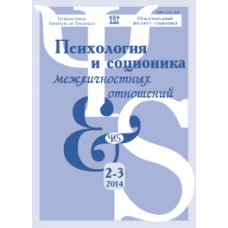Номер № 2-3/2014 журнала «Психология и соционика межличностных отношений»
Исследования
Эглит И.М., Тумольская В.А.
Переводы управления в информационной модели психики
Экспериментально исследовано последовательное срабатывание функций в информационной модели психики (модель А) в процессе обработки информации как перевод управления. Показано, что переводы осуществляются в основном из маломерных (69,2%) в многомерные функции (86,8%). Количество переводов из витала в ментал почти в 4 раза больше, чем из ментала в витал. Основная масса переводов осуществляется в блок Эго (около 70%). В то время как из блока Эго переводы единичны (3,6%), в основном это связь с блоком Ид. Результаты исследования подтверждают правомерность использования теории управления для интерпретации модели А.
Ключевые слова: соционика, психология, тип информационного метаболизма (ТИМ), информационная модель психики, функция информационного метаболизма, психическая функция.
Психология личности
Прокофьева Т.Н., Исаев Ю.В., Девяткин А.С.
Диагностика типа и формы страха по Ф.Риману
Статья посвящена тонкостям профессиональной диагностики, рассмотрены основные формы страхов по теории Ф. Римана, их проявления, затрудняющие диагностику типа информационного метаболизма, предложены методы различения проявлений форм страха и признаков ТИМа.
Ключевые слова: соционика, психоанализ, основные формы страхов, диагностика, признаки ТИМ, ФРиман, шизоидная, депрессивная, навязчивая, истерическая форма страха.
Практика типирования
Илясова А.Г.
Рисунки животных для определения соционического типа
Исследование содержит в себе анализ ответов, полученных при проведении методики «Рисунки животных», с целью определения соционических типов респондентов.
Ключевые слова: соционика, определение типа, FL (СЛЭ), LF (ЛСИ), ET (ЭИЭ), TE (ИЭИ), ES (ЭСЭ), IL (ИЛЭ), RF (ЭСИ).
Соционический практикум
Белецкая И.Е., Белецкий С.А.
Будни дуальных отношений: Дуальная диада ИЭЭ — СЛИ
Описаны закономерности и сложности дуализации в дуальной диаде интуитивно-этический экстраверт (IR) — сенсорно-логический интроверт (SP). Даны рекомендации по гармонизации отношений в этой диаде.
Ключевые слова: соционика, соционический тип, дуальные отношения, дуализация.
Дискуссии
Козин Р.А.
Вавилон или Социон?
Рассматриваются принципиальные вопросы соционики и методы определения соционического типа. Обсуждаются достоинства и недостатки различных подходов к этой проблеме.
Ключевые слова: соционика, психологический тип, темперамент, теория функциональных систем, нейропсихология.
Гипотезы
Малисов М.А.
Соционика и теория менталитетов
Рассмотрены точки пересечения соционики с теорией менталитетов С.Б. Переслегина, разграничены сферы применения данных типологий, описаны сходства и различия соционического типа и типа менталитета. Цель статьи: показать, что соционика и теория менталитетов могут использоваться как взаимодополняющие инструменты.
Ключевые слова: соционика, тип информационного метаболизма, менталитеты, типология Переслегина, диагностика, конфликтология.
Вопросы соционического образования
Гуревич О.В.
Планета людей
Предложена наглядная схема изображения социона как целостной системы.
Ключевые слова: соционика, соционический тип, экстраверсия, интроверсия, рациональность, иррациональность, логика, этика, сенсорика, интуиция.
Интервью
Аугустинавичюте А.
Роль женщины в соционике и в жизни
Интервью Аушры Аугустинавичюте — создателя соционики — о роли женщины в современном мире. Подчеркивается необходимость изменения социальных стереотипов о роли женщин и более активного участия их в жизни общества.
Ключевые слова: женские социальные роли, мужские социальные роли, стереотипы мышления и поведения, психология личности.
Психология и соционика 2-3/2014
- Модель: выпуск журнала «Психология и соционика…»
-
$3.00
- Цена в бонусных баллах: 30

